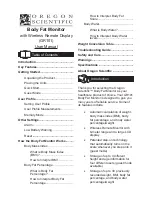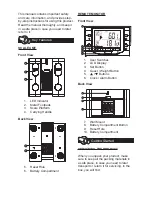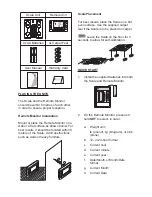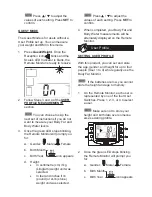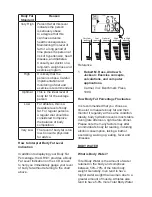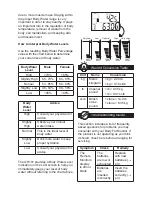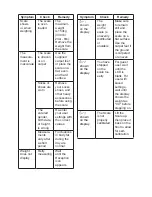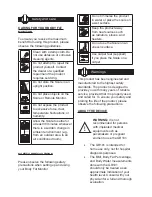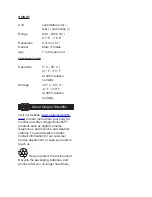
Asians have a separate BMI range
due to their different body composition.
Health
Indication
BMI
Range
Description
Under-
weight
Less
than
20.0
Your body
weight is
currently lower
than average.
Work toward
healthy, regular
food intake
and exercise
routine to
build up your
health to
recommended
levels.
*Asian
BMI:
Less
than
18.5
Recom-
mended
20.0
– 25.0
Your health
is at the
recommended
level. Maintain
a balanced diet
and exercise
to keep your
current level of
health.
*Asian
BMI:
18.5
– 23.0
Over-
weight
25.1
– 29.9
Your body
weight may be
above normal.
Increase your
exercise and
work out a diet
plan to lower
your risk for
serious illness.
*Asian
BMI:
23.0
– 29.9
Obese
30.0 or
greater
At this level,
you may be
at risk for
heart disease,
high blood
pressure, and
other illnesses.
Consult with
your doctor
to develop a
proper health
and fitness
plan.
*Asian
BMI:
30.0 or
greater
BMI should not be used as a
guideline for health risks for the following
groups:
Group
Reason
Children
and
teenagers
BMI ranges are only
based on adult heights.
Athletes
and body-
builders
BMI does not
differentiate between
fat and muscle, thus
making it inaccurate
for persons with high
muscle volumes.
Pregnant
or nursing
women
This group generates
naturally high fat
reserves as part of the
pregnancy.
References:
1. Jequier, E. (1987)
Energy, obesity, and
body weight standards.
2. American Journal of Clinical
Nutrition, 45, 1035-1047
3. Japan Society for the Study of
Obesity
4. The Weight Loss Research
Center
5. myDr. (www.mydr.com.au)
BODY FAT PERCENTAGE
What is Body Fat Percentage?
Body Fat Percentage is a measurement
of the total percentage of fat in your body.
For example, if you weigh 70 kg and your
Body Fat Percentage is 15%, then you
are retaining 10.5 kg of fat. The remaining
weight is composed of muscles, bones,
tissues, and water weight.

